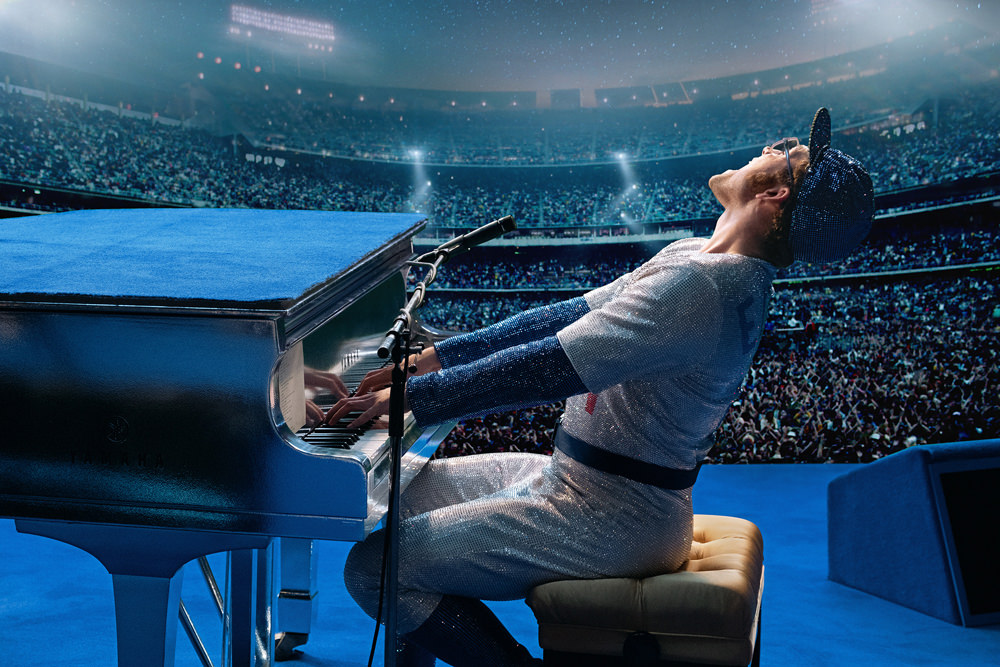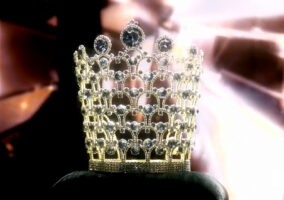
One thing any viewer of Rocketman should keep in mind throughout the film is that the subject was also the executive producer. While it wouldn’t be fair to the film’s director Dexter Fletcher (who took over Bohemian Rhapsody after Bryan Singer’s exit) and writer Lee Hall to dismiss their obviously considerable work in shaping Rocketman, it’s perhaps best to see this film less as a classic biopic and more like an autobiopic presented by a subject who is largely defined by his grandiosity, whimsy, and absolute need to make magic out of his pain. In other words, this is the biopic of a rockstar with severe insecurities who never felt truly loved – who then cast a beautiful, square-jawed, broad-shouldered movie-star version of himself to tell his story. This is not remotely a criticism. In fact, this is largely the point of Rocketman, which is that rare bird among rockstar biopics: an utterly joyful, highly whimsical take on extreme fame that all but ends every scene with the real Elton John turning to the camera and declaring “Well, that’s how I choose to remember it, anyway.” And besides, given the chance to spend tens of millions of dollars to tell their own life story, what gay man wouldn’t cast a hottie and fill the entire thing to the brim with as much fantasy, sparkle and magic as the film’s budget could handle?
Which isn’t to suggest that star Taron Egerton was in any way miscast or that the film is some sort of hagiography that glosses over John’s lowpoints or casts him entirely as a victim. Quite the opposite; Egerton is shockingly good and amusingly on-point as Elton, imbuing him with equal parts charm and fury, but never losing site of the idea that a man who reached this level of stardom would be naturally charismatic at a level that constantly drew others to him, as well as difficult to handle at a level wholly unlike people in the so-called real world. Even as his life is falling apart or he’s doing the typical rockstar biopic things like snorting coke in a limo, trashing a room in rage or trying to kill himself at a fancy L.A. pool party, Egerton never stops finding and uncovering the charm underneath all that drama and self-loathing. He’s never not a delight to watch, even when he’s being obnoxious to his fellow twelve-steppers or abusive to his closest friends. Egerton doesn’t attempt to perfect an eerie mimicry of John and the film is all the better for it. Instead, he makes smart choices about what type of person would be drawn to this life, let alone what kind would actually excel at it, marries that to John’s own flamboyance and self-loathing, and comes up with a fully rounded picture of a person instead of a wax-museum simulacrum of one. And yes, it helps his performance tremendously that he actually sings John’s songs in a fairly impressive recreation of John’s own younger vocal style.
Admittedly, there are times – especially throughout the second half of the film – where things get a bit maudlin and jukebox-musical in tone. A good portion of the singing of John’s classic songs are turned over to other characters or to the young actor playing the former Reginald Dwight as a boy. This works sometimes, but all too often, you’ll find yourself wishing you could hear the stadium rock versions of these classics. But like a jukebox musical – and we predict this entire film will be plopped down onto a Broadway stage practically unchanged within the next 5 years – the point is to use the oeuvre of an artist to define that artist’s life, which means sometimes you have to turn the singing of his hits over to his mother or his business manager or his songwriting partner in order to illuminate or underline what those songs meant to the singer and how they slot into the arc of his journey. Sometimes this only partially works and sometimes, as in the “Saturday Night’s Alright (For Fighting)” number depicting his teenage years, the results are some of the best musical numbers mounted on film in the last decade or two. Of course none of that matters if you can’t deliver the full Elton John concert experience to the audience at least a few times and thankfully, the film does not hold back in that regard. His legendary, career-making 1970 performance at the Troubadour is lovingly and whimsically recreated in a beautiful scene that depicts what it must feel like to be an artist at the height of your powers holding a besotted and electrified audience in the palm of your hands. Egerton is absolutely fantastic in scenes like these, perfectly demonstrating the manic qualities of the young performer, as well as the wit and sheer love of music that characterized his approach. He’s equally as good at playing the crippling self-hatred that characterized the lives of so many queer people back in the days when out gayness was a career-killer and life-ruiner. The days when the conventional thinking on queer people was that they couldn’t possibly be loved or find happiness in their lives because the entire world didn’t think they deserved such things. This, along with Egerton’s joyous performance, is what sets this film apart from so many other rockstar biopics, allowing the film to traverse the cliches of the genre, imbued with a glittery wit and a very gay sense of bitchiness (not to mention desire) that sets it FAR apart from the very similarly-themed Bohemian Rhapsody. It’s something of a shame that Rami Malek won the Oscar for playing such a neutered version of Freddie Mercury last year, because it makes the likelihood of Egerton’s (far more deserved) potential Oscar seem like that much more of a longshot.
Regardless of whether it secures the appropriate huzzahs and awards, Rocketman is a cinematic, artistic and musical success anchored by a stunning lead performance, an excellent supporting cast (Richard Madden will make you sweat, Bryce Dallas Howard will make you hiss, and Jamie Bell will absolutely make you cry), and fantastically executed numbers of some of the greatest pop songs of all time. See this one in a theater. It’s worth the ticket.
[Photo Credit: Paramount Pictures]
“Rocketman” Star Bryce Dallas Howard at SiriusXM Next Post:
Cast of “Big Little Lies” at the Season 2 Premiere
Please review our Community Guidelines before posting a comment. Thank you!



